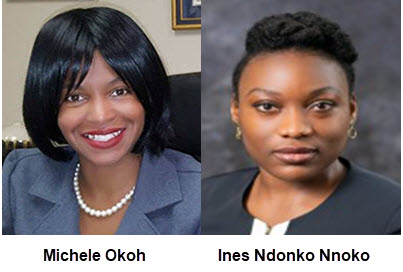Become a Patreon!
Abstract
Excerpted From: Michele Okoh and Ines Ndonko Nnoko, The Need for Social Support from Law Schools During the Era of Social Distancing, 16 FIU Law Review 117 (Fall, 2021) (94 Footnotes) (Full Document)
 The COVID-19 syndemic drastically changed law students' lives and expectations for the future. During 2020, students had to survive in a world in turmoil. Some students went weeks without interacting with others, and some students were afraid to leave their homes. There were students who had no idea where to find help for even the most basic of needs, such as food. Law graduates expressed confusion about their futures. They were unsure of their job prospects. Some were afraid to take the bar exam because they felt unsafe taking an in-person exam. Both international law students and graduates worried about whether they would be able to stay in the U.S. or return to their home countries. Law students and graduates were overcome with stress and isolation.
The COVID-19 syndemic drastically changed law students' lives and expectations for the future. During 2020, students had to survive in a world in turmoil. Some students went weeks without interacting with others, and some students were afraid to leave their homes. There were students who had no idea where to find help for even the most basic of needs, such as food. Law graduates expressed confusion about their futures. They were unsure of their job prospects. Some were afraid to take the bar exam because they felt unsafe taking an in-person exam. Both international law students and graduates worried about whether they would be able to stay in the U.S. or return to their home countries. Law students and graduates were overcome with stress and isolation.
There also seemed to be a disconnect between the support that was available to students at law schools and their perception of that support. Law schools must acknowledge the world in which their students now live and the appropriate support they now need in order to navigate it. Law students did not expect the tumultuous events of 2020. Their realities shifted, and they now live in a world of unrest and uncertainty. Ignoring these facts does little to benefit these students. This essay will discuss how social support can be used by law schools to help their students during the COVID-19 syndemic.
[. . .]
Due to the crisis, law students need the support of their law schools. For our educators, students, and practitioners to be prepared for the realities that they now face, all tiers of support must be given substantial consideration. Law schools can meet these needs by focusing on providing their students with perceived social support. This focus means focusing on how stress is impacting students but does not necessarily mean throwing more money at the problem. An effort as simple as streamlining communications can make a significant difference in how students perceive the availability of their institutions. To prioritize resources, the MSPSS can be used to assess which students are in need of additional social support. A focus on social support means identifying what supports are available to students and maximizing the effectiveness of those supports. For some students, this may require more effort on the part of the law school, but, this may not be the case for all students. If certain students are identified to have strong support systems, prioritization of more isolated students may be warranted.
Additionally, support does not need to come solely from faculty and staff. Once students' existing social supports are identified, law schools can leverage peer groups to fill in those gaps. These can be interest groups or those arising from group assignments. Similarly, peers can also be utilized for checking in with other students. The point of social support theory is not to replace existing social supports but to find ways of maximizing existing supports and providing supports that are missing. It also means shifting away from thinking solely about what an individual is actually receiving to emphasizing what an individual perceives to be available. During this time of social distancing, law students need to know that their law schools are there to support them. They need reassurance and connection, and law schools can fulfill this need by ensuring that students believe that they will have the support they need, when they need it.
Michele Okoh currently serves as a Senior Lecturing Fellow of law with the Duke Environmental Law and Policy Clinic.
Inès Ndonko Nnoko is an associate in research with the Duke Center on Law and Technology.
Become a Patreon!


